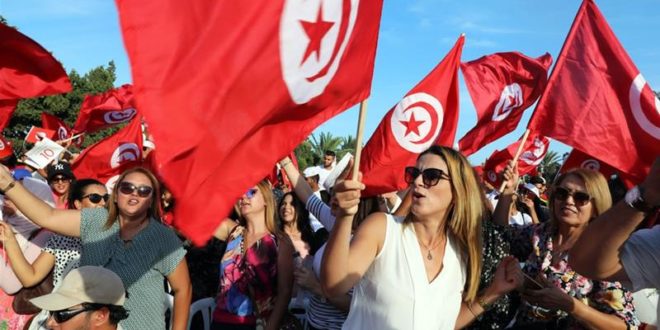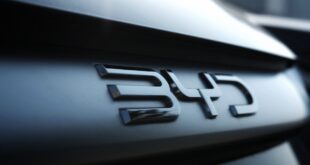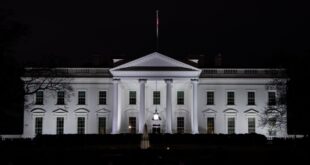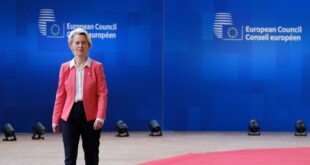Giancarlo Elia Valori
The elections held in Tunisia saw 7,065,883 registered voters, with 49% of women and over a third of voters under 35 years of age. The voters outside the national territory were 385,546.
There were 217 seats to be assigned and 4,871 polling stations with 12,000 international observers.
The lists were closed: hence the voters elected the candidates already chosen by the party they selected from the list.
Currently the seats in Tunisia are allocated according to the Hare-Niemeyer method (also known as the largest remainder method), which requires the numbers of votes for each party to be divided by a quota representing the number of votes necessary to win a seat.
The result for each party usually consists of an integer part plus a fractional remainder. Each party is first allocated a number of seats equal to their integer. This generally leaves some seats unallocated: the parties are then ranked on the basis of the fractional remainders and the parties with the largest remainders are each allocated one additional seat until all the seats have been allocated.
The candidates are alternated between men and women in 33 multi-member electoral zones, as well as in 27 constituencies on the national territory, in addition to 6 for Tunisians abroad.
Electoral systems always determine the results.
It should also be recalled that the 2011 movement, which led to new elections after the fall of Zine El Abidine Ben Ali, has also drafted a new Constitution. It is essential to stay in power with the democracy granted by Western manipulations, including the jihadist ones.
The last few years, however, have been marked by an alliance between Nidaa Tounes, a secular party, and Ennahda, the political movement linked to the Tunisian group of the Muslim Brotherhood.
As to the candidates for Presidency, the Tunisian law requires that each competitor to the office behaves consistently with the constitutional values, shows financial guarantees and, finally, all the necessary documents of support from the parties and the groups of reference. Obviously each candidate shall also demonstrate of not having any criminal or civil conviction in place or already served.
Let us examine the candidates who took part in the Presidential and Parliamentary elections.
This will be the best possible interpretation to analyse Tunisia’s internal political structure.
In fact, it should be recalled that on September 15, 2019, the last Tunisian presidential election was held, with two main contenders, namely Kais Saied and Nabil Karoui.
In the second round, on October 13, 2019, the independent candidate Kais Saied won before his contender Nabil Karoui, labelled as “populist” by the Western media.
Kaid Saied, labelled as “conservative” by Western media, which are very good at creating banal labels, is a jurist and a professor of constitutional law at the University of Tunis.
He obtained 27.5% of votes, with a turnout slightly over 50% of those entitled to vote.
His electoral campaign without public funds at his disposal and with no party support was focused only on the fight against corruption.
Another theme of Kaid Saied’s campaign not to be overlooked is the federalist reform of administrative, tax and political regulations.
It is certainly surprising to see a federalist solution in a small country like Tunisia, but it should be noted that on May 6, 2018, local elections were held – on the basis of the 2014 Constitution – for as many as 350 Tunisian municipalities and regions.
It should also be recalled that the fragmentation and splitting up of representation was an old and ingenious idea of Habib Bourghiba.
Furthermore, the 2014 Constitution devotes the whole seventh chapter to the structure of local power.
In the last elections of May 2018, 37.16% of the local seats was won by candidates under 35 years of age, with 29.55% of the local presidencies won by women, who gained 47.05% of all the seats assigned.
The independent lists won massively also in local elections. In fact, Kaid Saied, the winner of the very recent run-off, repeated – at national level – the small miracle of the 2018 local elections.
It should be recalled, however, that only 35.7% of registered voters really went to the polls.
Nabil Karoui had been released from prison 48 hours before the elections, where he had been staying since last August 23. He had been arrested on charges of money laundering, financial fraud and corruption.
In the first round, however, Karoui had obtained 15.6% of votes, thus qualifying for the final round.
Karoui is the owner of Nessma TV and, in any case, regardless of the election results, his assets have been frozen and he cannot expatriate.
His release has even called into question the election regularity from the legal viewpoint.
However, only the leadership of Ennahda, the political faction of the Tunisian Muslim Brotherhood, branded Saied as “conservative”.
In principle, voters’ disappointment regards the “free market” reforms and the so-called “austerity” policies. However, the current political and hence electoral tension concerns above all unemployment, which is now over 15.6% and mainly affects the younger groups.
Not to mention the high inflation rate, which is equal to 6.7% but is relatively stable. Prices, however, rise by 0.6% every month, and this is essential to understand people’s feelings and mood.
According to the World Bank data – unlike what is known as on the spot rate – the average inflation rate, based on daily data, has been only 5.3% from 1963 to 2019. Hence nothing new under the sun.
As fully confirmed by the latest data, the growth rate for 2019 is equal to 1.5%.
However, according to the Monetary Fund, it will grow by 2.4% in 2020 and 4.4% in 2024.
Moreover, before elections, the Tunisian government has developed a new economic policy for purely electoral considerations, with an eye to winning votes.
The pillar of this policy is, essentially, to maintain a “sustainable” budget deficit, and hence of foreign debt, with a more careful control of the inflation rate and with a structural reform of public finance.
The idea is to reduce the budget deficit to 4.9% of GDP as from 2019.
The latest data on inflation, however, points to an increase of up to 7.2%, which is anyway physiological, although the so-called international bankers regard it as a severe alarm.
The Tunisian government is also planning to reduce wage and salary growth to 12% of GDP, as well as to increase the retirement age from 60 to 65 years.
Finally, it also plans to retire – without replacing them – thousands of civil servants until 2020, especially those over 55 years of age.
That is why some of these policies are under the voters’ scrutiny.
Wage cuts and actual stop of hiring in the public sector, as well as the increase in the fuel price and the above-mentioned debt restructuring partly funded by a 3 billion USD loan granted by the International Monetary Fund.
The jihadist issue, too, is causing debate. Over one thousand of the known 5,000-6,000 foreign fighters are already in prison in Tunis.
There are also 1,600 other prisoners in Tunisia who are accused of belonging to jihadist organizations, although they have not gone to fight abroad.
Finally, there are also about 2,500 jihadist militants, who are still entrenched in the Western mountains.
Despite the good anti-jihadist policies implemented by the Tunisian government, all Qaedists are still there, at the core of trafficking and situations that Tunisia, as well as other Maghreb countries, cannot fully control.
Moreover, we do not know whether the new President, who lacks a party supporting him, will have the strength to impose himself on a rather fragmented Parliamentary scene.
Let us see, in fact, who were the main candidates for Presidency, all long-time politicians.
Let us begin with Mohamed Abbou, the candidate of the Social Democratic Party known as the “Democratic Current”.
He was formerly the leader of the only real opposition party during Ben Ali’s rule, the Congress for the Republic.
Minister in charge of Administrative Reform after 2011, he quickly resigned from his post in controversy with the other parties, which did not give room for manoeuvre.
Another candidate was Abir Moussi from the Free Destourian Party, hence de facto heir to Bourguiba’s and Ben Ali’s great tradition.
Westerners, who like to put labels, define her a “populist”, but she is the sworn enemy of Ennahda, the party of the Muslim Brotherhood that she often declares she “wants to send back to prison”.
The candidates standing for the last Presidential election included also the aforementioned Nabil Kharoui, who is the owner of Nessma TV, the private satellite channel of which both Mediaset and Quinta Communications, a company of Tarak Ben Ammar, are shareholders.
It should be recalled that also Gaddafi had tried to acquire a shareholding in Quinta Communications, but the 2011 rebellion killed the Libyan Colonel and hence stopped the operation in Tunisia.
As a strong supporter of the late President Essebsi, before the last election Abir Moussi had founded the Heart of Tunisia Party.
Promoting her image as “candidate for the poor”, she is anyway active in charity work through her associations throughout the Tunisian territory, especially in marginal areas.
She was leading the opinion polls before the election.
Another candidate for Presidency was Lofti M’Raihi, proposed by the Union Populaire Républicaine, a social-national (but not national-socialist) party. He is a politician who speaks out mainly against “corruption” and proposes “direct democracy”, although not through the Internet.
Apart from his positions centred around opposition to the ruling establishment, which he accuses of corruption and the use of political media to serve narrow interests, his platform is similar to what in the West we would call “reformist”.
Another candidate was Mehdi Jomaa, the former Head of government in the technocratic phase from January to February 2015, which came as an alternative to the political alliance dominated by Ennahda.
He had previously served as Minister for Industry and Trade in the Troika government between 2011 and 2013.
The Troika was an alliance between Ennahda, the Democratic Forum for Labour and Liberties, also referred to as Ettakatol – now strong only in Kasserine – and finally the Congress for the Republic.
Currently Mehdi Jomaa is the candidate of Al Badil Ettounsi, a liberal-republican Party with secular and conservative tendencies.
With a view to better describing Tunisia’s political landscape, we need to mention also another candidate for the Presidency, namely Hamma Hammami, the leader of the Popular Front, a coalition of small leftist parties.
As one of the old leaders opposing the former authoritarian regimes of Bourghiba and Ben Ali, he was very popular during the 2011 uprising. He believes, however, that Ennahda runs also a secret apparatus that collaborates with the “regime”.
In his opinion, the current rulers are simply “foreign agents”.
Another candidate was Mohammed Moncef Marzouki, who served as former President of Tunisia from 2011 to 2014, through the endorsement of members of the Constituent Assembly.
He was also a candidate in the 2014 presidential elections against the last President Essesbi, receiving 44% of the total votes cast.
He is known for his long political struggle and opposition against the authoritarian regimes in the era of Bourguiba and Ben Ali, as well as for his human rights activism. He was the most prominent leader of the Congress for the Republic Party, later named Al Irada. In the last election he ran as leader of the brand new coalition “Another Tunisia Alliance”.
As President, he had constantly criticized Assad’ Syrian regime and the Egyptian leaders. He was one of the harshest opponents of Essebsi’s government, but his electoral campaign also focused on the fight against universal corruption and shameful media manipulation in favour of the regime.
Mention must also be made of Abdelkarim Zbidi, former Defence Minister and heir to Essebsi.
He is a doctor and served as Defence Minister in the 2011-2013 and 2016-2019 governments.
He, too, is a bitter enemy of Ennahda and the Muslim Brotherhood.
Abdelfattah Mourou is Ennahda’s candidate. He is the current Speaker of Parliament. He is a traditionalist, but with the widespread reputation of being “moderate” and “tolerant”.
He supports democratic and pluralist Islam, but he has undoubted personal prestige and credibility both within the political class and the public at large.
He still hangs a portrait of Habib Bourghiba in his house, as he has declared to the Tunisian press.
Another candidate for the Tunisian Presidency was Youssef Chahed, former Head of the National Unity Government since August 27, 2016, serving as Minister for Local Development.
He was a former member of the aforementioned Republican Party and later of Nidaa Tounes, also known as Call for Tunisia, which is the political group founded by Essebsi.
Currently he is honorary President of the Tahya Tounes Party, also known as “Long Live Tunisia”.
He, too, fights a war against corruption, although critics have accused him of the same practices for which he criticizes his adversaries, i.e. exploiting public facilities and State resources in favour of his election campaign and to politically eliminate his opponents.
The female candidates included also Selma Elloumi Rekik, running for the Amal Tounes Party after her final separation from Nidaa Tounes.
She had already served as Minister in Habib Essid’s government (2015-2016) and she emphasized her commitment to continuing the path of the late President Essesbi, reaffirming her diligence to represent all social groups and defend women’s rights.
With a view to describing the Tunisian political dynamics, we also need to mention the candidate Ahmed Safi Saïd, who ran in the presidential race for the second time as an independent.
He enjoyed the endorsement and support of the People’s Movement, which has an Arab Nasserist nationalist ideology.
He is a refined intellectual and public figure – also with a Western background – and he much relies and bets on the youth voters’ base. He supports an idea of Tunisia as middle regional power, albeit decisive, among the various Maghreb players.
He also wants to strengthen and empower the intelligence Services, the true axis of every modern country.
He also has an ideology contrary to what nowadays is defined – confusingly – neo-liberalism. He wants a Tunisian society with enhanced military capabilities, suitable for rising up to the post-modernity challenges, including the regional ones.
The presidential candidate of the Social-Democratic Union was Abid Bikri, the current Secretary-General of the movement Tunisie En Avant (Tunisia Forward).
He was a senior leader of the Tunisian General labour Union prior to his appointment as Minister for Public Service and Governance in the National Unity Government of 2016-2017.
Chayed, too, has started another obvious fight against corruption, which is his sworn enemy.
He is another candidate opposing “Ennahda’s secret apparatus”, which indeed exists.
He is particular interested in resolving the situation in Libya.
Hence the divisions and fragmentation of the Tunisian political landscape are the a posteriori explanation of the 2011 rebellions.
GIANCARLO ELIA VALORI
Honorable de l’Académie des Sciences de l’Institut de France
President of International World Group
 Geostrategic Media Political Commentary, Analysis, Security, Defense
Geostrategic Media Political Commentary, Analysis, Security, Defense





